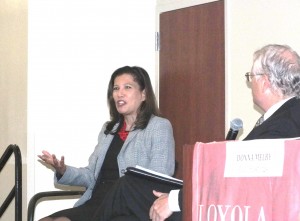
California Supreme Court Chief Justice Tani Cantil-Sakauye speaks before journalists at a Loyola School of Law luncheon May 29. To her right is Prof. John T. Nockleby, director of Loyola’s Civil Justice Program. PHOTO BY FLORANTE IBANEZ
LOS ANGELES — Did you know that the highest-ranking judge in California, the Chief Justice of California’s Supreme Court, is a Filipino American woman who rose from humble roots in Sacramento?
Chief Justice Tani Cantil-Sakauye on May 29 spoke briefly of her family’s farming background and life lessons she learned from the experience, as the 10th “Journalist Law School” at Loyola Law School held a luncheon for members of the news media.
The program trains professional journalists who cover the courts on national, regional or local levels, to better meet the challenge of reporting on the legal system even if they don’t have a law degree. Loyola Law School provided scholarships to 35 professional journalists.
Chief Justice Cantil-Sakauye was featured in a dialogue at the luncheon with program organizer Prof. John T. Nockleby, director of Loyola’s Civil Justice Program.
She recalled her family’s deep belief in hard work, being grateful for the opportunity to work, and faith in the American Dream — “where if you went to school, worked hard and respected elders, that you could succeed from school and get a job.”
Cantil-Sakauye thanked some of her mother’s sayings for giving her wisdom: “There for the Grace of God go you” and “You listen to everyone because everyone has something to say,” which the Chief Justice says have influenced how she presides over cases, how she listens to attorneys and listens to complaints, even when she disagrees with them.
She also spoke to issues of gender. Being only the second woman to hold the position of Chief Justice, she said she faced certain assumptions; that when she appeared as a young prosecuting attorney, it was often assumed she was the court clerk, even by the judge.
Women lawyers, she said still have a long road to travel for recognition and that only as the legal profession becomes more diverse would the profession get used to the idea that it no longer is just a white male-dominated field.
During the dialogue and short question and answer session, Cantil-Sakauye also spoke on the death penalty, the challenge of administering all the levels of the very large state court system, and dealing with problems of increased court fees and a shrinking state budget for the courts to run and still be able to function fairly. She said that many of these issues are not solvable from the courts but must be addressed by the the legislature.
Chief Justice Cantil-Sakauye was well received for her candidness and obvious mastery of her responsibilities.
Like us on Facebook